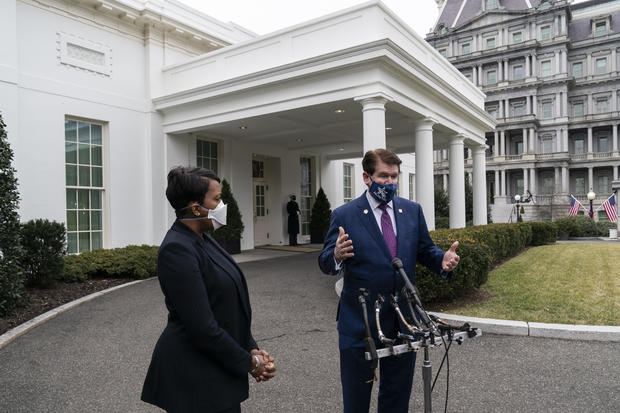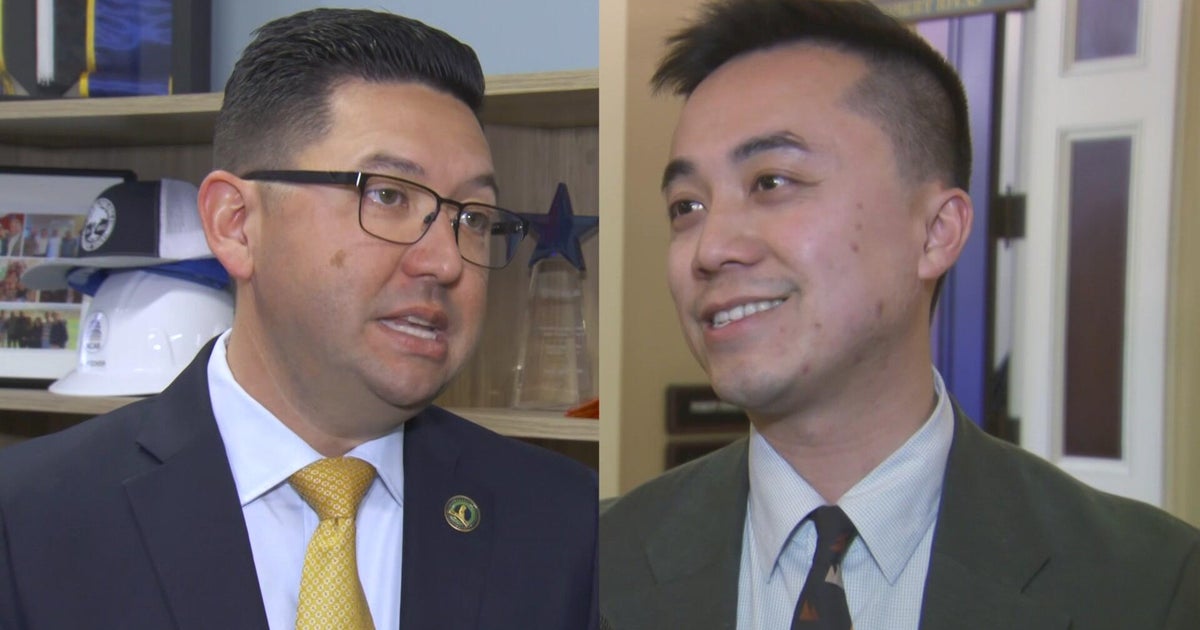At odds with national Republicans, GOP mayors welcome long-awaited COVID relief
Washington — As President Biden embarks on his tour to push his $1.9 trillion COVID-19 relief package, GOP mayors are emerging as vocal defenders of the president's plan as they prepare for an infusion of federal dollars to address financial woes brought on by the pandemic.
The mayors, who represent cities of varying sizes, have split from their fellow Republicans in Congress who opposed federal aid to state and local governments. Instead, they argue the $350 billion in aid included in the American Rescue Plan is going to provide their cities with relief to help local economies bounce back, including by providing assistance to small businesses and boosting vaccination efforts.
"You'd think people in a crisis, particularly a health crisis, would rise above partisanship and rise to the occasion of dealing with emergencies and agree to have partisan fights later after the crisis is over," John Giles, the Republican mayor of Mesa, Arizona, told CBS News. "But that just isn't what we've seen."
While the earlier $2 trillion relief package signed into law in March 2020 included federal assistance for states and some local governments, further aid was a major sticking point in congressional negotiations over subsequent coronavirus rescue measures. More funding for localities was ultimately left out of further packages, even as mayors of both parties issued increasingly dire warnings of budget cuts and layoffs to address shortfalls stemming from a decline in tax revenues.
But with Democrats holding a slim majority in Congress, GOP opposition to the aid was no longer a barrier to its inclusion in Mr. Biden's $1.9 trillion package, and the plan approved without Republican support and signed by the president into law last week provides $350 billion total in assistance to states and local and tribal governments.
Under the package, $195.3 billion is allocated to states, and $120.2 billion will go to local governments to mitigate the effects of the coronavirus crisis. The money cannot be used to offset tax cuts or fund pensions.
"This is not about passing out every dollar in an Oprah Winfrey sort of way — 'You get money, you get money, you get money,'" said Bryan Barnett, the Republican mayor of Rochester Hills, Michigan. "We want to make sure we're planning to stand on our own two feet in the foreseeable future."
The CARES Act provided direct aid to local governments with a population of at least 500,000, and Rochester Hills did not qualify for that money. But Barnett expects the city will receive between $5 million and $10 million from this tranche of federal assistance. The money will be used to plug holes in the budget and offset losses in park revenues and building fees, as well as provide relief to small businesses, he said.
Barnett, who was mayor during the Obama administration's efforts to stimulate the economy after the Great Recession, said he hopes the Biden administration has learned from that stimulus rollout.
"The recovery was pretty anemic," he said of the 2009 effort. But this time, "there has been a strong federal response and state response as well."
Still, Fort Worth Mayor Betsy Price echoed concerns from congressional Republicans about the long-term fiscal impacts of a $1.9 trillion stimulus, telling CBS News she is worried her children and grandchildren will be saddled with the consequences from the spending.
"You really have to get this money somewhere it's going to generate a good return," she said, adding the relief package contained provisions unrelated to the pandemic.
Fort Worth is likely to get $180 million through the plan, Price said, which will be put toward broadband and assistance for small businesses, as well as vaccine administration and COVID-19 testing.
While many cities took steps to address a drop in revenues as residents were ordered to remain in their homes to mitigate the spread of the coronavirus, the level of cuts varied.
Buoyed by sales taxes collected from online purchases, Giles said Mesa did not experience a dramatic loss of revenue. Expenses did surge, but that pain was eased by $90 million in direct federal aid the city received through the CARES Act last year, which was used to provide services for residents grappling with the economic fallout from the pandemic.
The city shut down its libraries, performing arts centers, museums and recreational programs and reassigned workers to form a COVID response team to assess and respond to the needs of the community. Other Mesa employees were redeployed to run a food bank at its convention center or box food, Giles said.
The city also launched its own grant program for small businesses, bought laptops for students for remote learning and provided meals to health care workers, which assisted not only hospital and nursing home staff, but also local restaurants that had to close their dining rooms.
"The front door was closed, but the kitchen was busy making meals for frontline workers and health care workers, and the city was picking up the bill," Giles said.
Mesa is expected to receive between $95 million and $110 million from the latest coronavirus relief package, which Giles said will be used to continue its existing programs and assist the vulnerable.
"The pandemic is not over," he said, "so the needs we've been addressing with all of these unusual expenses continue. They persist."
Giles and other GOP mayors are adamant that every dollar of the federal assistance their cities receive will go toward addressing the coronavirus crisis and reviving their local economies. But Republicans in Congress have opposed the aid because they argued it would be used to "bail out" Democratic-run cities and states they say have mismanaged their finances.
"This is not a bailout," said Jeff Williams, GOP mayor of Arlington, Texas, who was one of five mayors to meet with Mr. Biden at the White House last month to discuss COVID relief. "This is needed funds after a natural disaster, which is still going on."
Arlington is expected to receive roughly $80 million, and Williams said the money will fund vaccination sites and mobile units deployed to neighborhoods, restore city programs and fill open positions following a hiring freeze, and assist small businesses.
The aid will especially help alleviate the costs associated with Arlington's mass vaccination center, which costs the city more than $400,000 per week to operate, the mayor said.
"Mayors on both sides of the aisle recognize the fact we believe we can use the money well, and really investing in American cities is going to be a wise investment to get us out of the pandemic and reach economic recovery a lot sooner," Williams said.
In addition to providing $350 billion to state and local governments, the $1.9 trillion COVID relief package also gives Americans making up to $75,000 checks for $1,400, includes a child tax credit of up to $3,600 and allocates $14 billion for vaccine distribution.
With the billions of dollars in assistance set to be rolled out, Mr. Biden, Vice President Kamala Harris and their spouses are embarking on a nationwide tour to promote the plan. Dubbed the "Help is Here" tour, stops for the foursome include schools, vaccine sites and small businesses.
According to ABC News, White House deputy chief of staff Jen O'Malley Dillon told senior staff in a memo that part of the administration's outreach efforts will be mobilizing more than 400 mayors and governors on both sides of the aisle.
Giles said he hasn't been asked to participate, but would lend his help if needed.
"I would be happy to shake the president's hand and thank him for what he's done," he said.




